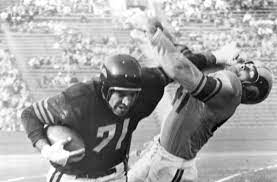For several years Connor was a color commentator on CBS telecasts of NFL games, often working with lead announcer Jack Drees.
Connor worked as a manufacturers' representative in Chicago after his retirement from the NFL. He died in Evanston, Illinois on March 31, 2003, aged 78 after a long illness.
Sources
https://www.pro-football-reference.com/
https://www.profootballarchives.com/index.html
https://americanfootballdatabase.fandom.com/wiki/Football_Wiki
https://www.gridiron-uniforms.com/GUD/controller/controller.php?action=main
https://www.profootballhof.com/hall-of-famers/
"Chicago | Bears in the Hall – George Connor". Chicagobears.com. Archived from the original on November 2, 2017. Retrieved December 10, 2016.
Hayes, Neil (August 10, 2008). "Little Big Man: Smallest of infants turned out to be one of the giants of college and pro football" (PDF). Chicago Sun-Times. Archived from the original on March 26, 2016. Retrieved December 10, 2016.
"Miller and White of Notre Dame Gain All-America Football Posts" (PDF). The New York Times. December 8, 1943. (subscription required)
"Reflections of the Dome – April 2003". Irishlegends.com. Retrieved December 10, 2016.
Litsky, Frank (April 2, 2003). "George Connor, 78, Standout For Notre Dame and the Bears". The New York Times. Retrieved December 10, 2016.
"George Connor, 78; Hall of Fame Linebacker for the Chicago Bears". Los Angeles Times. April 2, 2003. Retrieved December 10, 2016.
"George Connor Bio :: Notre Dame Football :: UND.COM :: The Official Site of Notre Dame Athletics". Und.Com. Retrieved December 10, 2016.
"George Connor was football's first linebacker". The Marion Star. November 10, 1984. Retrieved January 17, 2020 – via Newspapers.com.
"George Connor Stats". Pro-Football-Reference.com. Sports Reference LLC. Retrieved December 10, 2016.
"Football's First Linebacker". Sarasota Herald-Tribune. December 9, 1984. p. 9. Retrieved December 10, 2016.
"NFL's All-Decade Team of the 1940s". Pro Football Hall of Fame. January 8, 2010. Retrieved December 10, 2016.
Jack Connor, Connor: The Life Story of George Connor. Chicago: Chicago Publishing, 2002.
Bob Curran, Pro Football's Rag Days. Englewood Cliffs, NJ: Prentice-Hall, 1969; pp. 191–199.




No comments:
Post a Comment